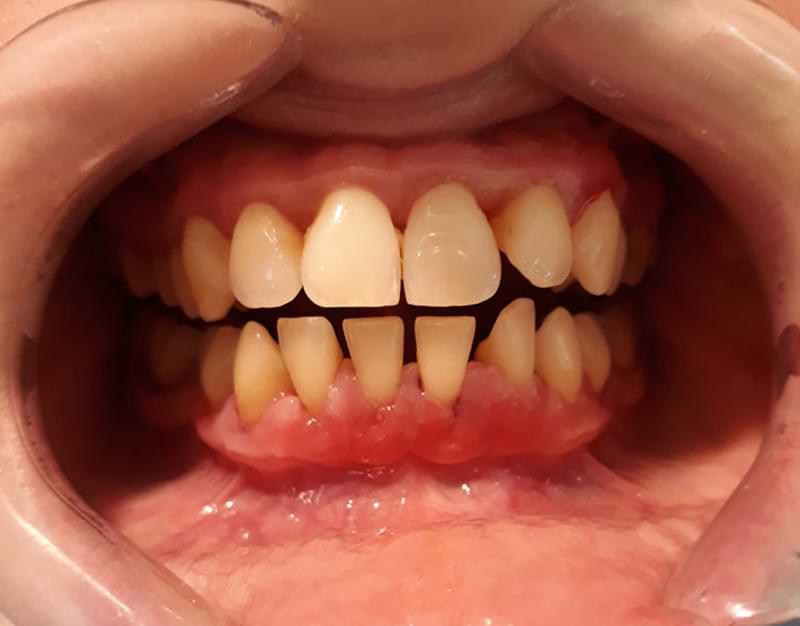
Let’s not sugar-coat it: dentures were not designed with receding gums in mind. Ideally, dentures will slot in the mouth supported by a set of healthy gums. If your gums have shrunk back on themselves, false teeth fittings will be more complicated, though certainly still doable. That said, if you’re experiencing gum recession, there’s likely something else at play that you should deal with first.
In this blog post, we’ll discuss the relationship between dentures and receding gums, as well as how to resolve the issues born from these less-than-compatible parties coming together. But before we get into the crux of it, let’s address the most pressing question related to this topic.
Can Dentures Be Fitted to Receding Gums?
As mentioned above, dentists can fit dentures to receding gums, but they’ll need to either a) ensure that the gums will support the dentures or b) make up the difference if they don’t. You need to have a stable base upon which to place the dentures, or else the false teeth may fail to fit or function as they should. Moreover, false teeth sans a secure base can lead to an unstable bite, discomfort and even issues with speech. So, when are dentures not an option? When you’ve yet to resolve your receding gums. Only when you address and treat the issue behind it should you investigate denture options.
What Has Caused the Gums To Recede?
If you’re experiencing gum recession, a number of things may have caused it. Some causes can include abrasive brushing, dental trauma, dental misalignment, tobacco usage or even lip or tongue piercings. However, the most likely culprit is some form of gum disease like gingivitis—or, more critically, periodontal disease (aka periodontitis).
Periodontitis is essentially gingivitis’s second stage if it goes left untreated. As the name may suggest, gingivitis is inflammation of the gingiva: the portion of the gum that sits at the base of the teeth. Periodontitis occurs when this inflammation spreads to the periodontium—the soft tissue and bone that anchors teeth in place—and causes damage to it. If you’re noticing loose teeth in addition to your receding gums, chances are you’re dealing with periodontitis. You’ll need to treat this disease immediately to prevent further tooth loss.
Treating Periodontitis
Luckily for you, there is a range of treatments available for periodontal disease. The most obvious preventative treatment is to keep a healthy home care routine, which consists of brushing at least twice per day and flossing at least once per day. If you visit your dentist, they may be able to help you with a scale or root plane, the former of which will remove bacteria or tartar from the teeth’s surface and below the gumline, and the latter of which will provide a deeper clean by reaching the roots’ surfaces. If neither of these treatments do the trick, you may need to look into antibiotics or surgery.
Surgical treatments for periodontitis include flap surgery or pocket reduction surgery, soft tissue grafts, bone grafting, guided tissue regeneration, and applying tissue-stimulating proteins to diseased tooth roots. All of the above treatments involve altering either bone or tissue in such a way that will discourage further periodontal progression. All going well, periodontal disease should resolve following nonsurgical treatments; that said, we would encourage you to take all steps necessary to rid yourself of this advanced gum disease.
How Much Gum Is Left?
However much gum you have remaining will depend on your unique situation. If you have enough gum to support a set of dentures, you’ll be golden. If your gums fall short, you’ll need an alternative solution. Before investigating denture options, you should seek an assessment from your dentist. In any case, you will need to resolve any gum disease you’re experiencing before you can even contemplate this step.
What Happens if You Don’t Have Enough Gum for Dentures?
If you don’t have enough gum for dentures, there are ways around it. Consider some of these options.
Dental Implants
Rather than opting for dentures, why not go the whole hog and get dental implants?
Unlike removable dentures, these false teeth never leave your mouth as they’re rooted into the jawbone via titanium screws. This can be a great solution if you’ve sustained bone damage due to periodontitis.
Implant-Supported Dentures
Alternatively, you can invest in implant-supported dentures, whereby the titanium screws are rooted into the dentures themselves rather than your actual jaw. Securing your false teeth with screws can provide the biting power and support where your receding gums fall short.
Partial Dentures
Though they appear gap-toothed outside the mouth, partial dentures can be a good solution for those who need only to replace a few teeth rather than a full arch. As well as fitting the mouth better, partial dentures can also be a suitable solution for those with receding gums as they tend to rely less on gum support.
That said, partial dentures can also cause further problems if not managed correctly. If you’re noticing gum irritation, this may be due to the positioning of the denture hooks. If the issue persists following a hook readjustment from your dentist, gum grafting may be a better—albeit more invasive—solution.
Gum Grafting
Gum grafting may sound scary, but it’s less daunting than you may think. The procedure is simple: the dentist will extract a healthy piece of tissue from your gums or the roof of your mouth and then graft it onto the receding gum. After a one- or two-week recovery period, your gums will ideally be recession-free and fit for regular dentures. As always, though, be sure to get your dentist to check this off before proceeding with denture treatments.
Put an End to Gum Recession & Get Fitted
Once you’ve come out the other side of gum recession, you’ll know where to find us. At Direct Denture Care, we offer the greatest selection of dentures in Perth—full, partial, and immediate—as well denture repair services. If these are the false teeth you seek, make your appointment with us and before you know it, you’ll have a full set of teeth again. Who said gum recession had to hold you back?











